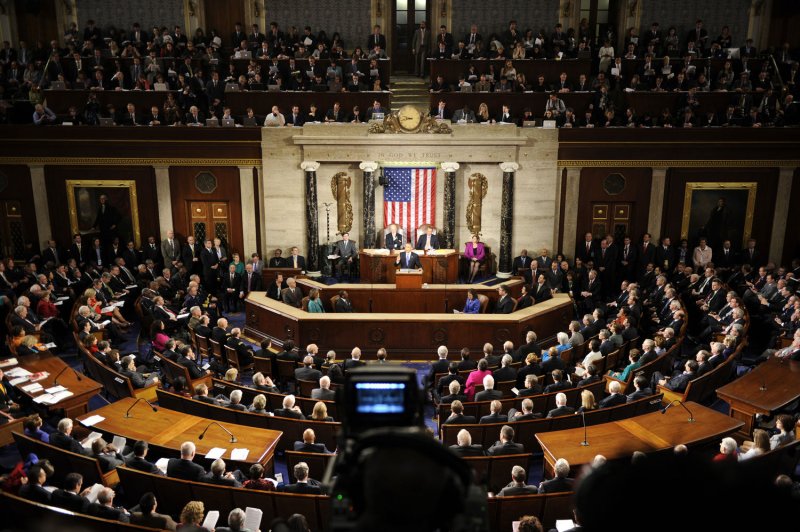US President Barack Obama delivers his State of the Union address during a joint session of Congress on February 12, 2013 at the US Capitol Building in Washington, DC. Obama's address, the first of his second term, centered on the economy, creating jobs and bipartisan legislation on reforming immigration. UPI/Mike Theiler |
License Photo
Anyone who thought last week's State of the Union address would usher in a new era of bipartisan cooperation and an end to crisis government in Washington was sorely mistaken.
President Obama's oft-repeated mantra of taking a balanced approach to the country's deficit was met by stony Republican silence as Democrats jumped to their feet to applaud. House Speaker John Boehner, R-Ohio, sitting on the dais behind the president looked fit to be tied. Indeed, earlier in the day he accused the president of being afraid of confronting the liberal wing of his party.
With the March 1 drop-dead date for draconian spending cuts fast approaching and Congress on a weeklong hiatus, the country was once again poised for convulsions that could stall the fragile economic recovery.
Before leaving town, Senate Democrats came up with a proposal to stave off the sequester -- the $85 billion in spending cuts through the end of the year mandated by the last-minute debt ceiling deal reach in August 2011 and the "fiscal cliff" agreement enacted at the beginning of this year. What Senate Democrats want to do is pare the spending cuts to $55 billion and raise a like sum in new revenue.
At a campaign-like appearance at a North Carolina auto parts plant to start pushing his domestic agenda, Obama indicated he's tired of the politics and urged Congress to stop focusing "on who's up and who's down. Let's just focus on ... common sense and cooperation."
House Budget Committee Chairman Paul Ryan, R-Wis., said the Democrats' approach just won't fly.
"It seems as if they [Democrats] think the heavy lifting on debt reduction, deficit reduction is behind us, we have just a little bit left and then we're done," Ryan said. "I really worry that our partners in government, here -- two-thirds of it, the Senate and the White House -- are deluding themselves in thinking this thing is taken care of."
Republicans made a bad bet. The approach they adopted in the last four years -- stall until the 2012 election on the assumption Obama would not be re-elected -- proved more detrimental to the Grand Old Party than to Democrats once the ballots were counted. The cuts, which slash defense and domestic spending equally, never were supposed to happen.
"These sudden, harsh, arbitrary cuts would jeopardize our military readiness. They'd devastate priorities like education, and energy and medical research. They would certainly slow our recovery, and cost us hundreds of thousands of jobs. That's why Democrats, Republicans, business leaders, and economists have already said that these cuts, known here in Washington as the sequester, are a really bad idea," Obama said in his speech.
"Now, some in Congress have proposed preventing only the defense cuts by making even bigger cuts to things like education and job training, Medicare and Social Security benefits. That idea is even worse."
Sen. Mark Rubio, R-Fla., who gave the Republican response, didn't directly address the sequester, opting instead for the familiar GOP theme of reducing taxes to grow businesses, leading to more jobs.
"The real cause of our debt is that our government has been spending $1 trillion more than it takes in every year," Rubio said, later adding, "In order to balance our budget, the choice doesn't have to be either higher taxes or dramatic benefit cuts for those in need. Instead, we should grow our economy so that we can create new taxpayers, not new taxes, and so our government can afford to help those who truly cannot help themselves."
Obama said he realizes debt reduction "must be part of our agenda. But let's be clear, deficit reduction alone is not an economic plan."
And the Federal Reserve backs him up.
Fed Vice Chairman Janet L. Yellen told an economic forum last week if Congress and the president had not acted to avert the "fiscal cliff," it "likely would have ... [created] a headwind strong enough to blow the United States back into recession. Negotiations continue over the extent of spending cuts now due to take effect beginning in March, and I expect that discretionary fiscal policy will continue to be a headwind for the recovery for some time, instead of the tailwind it has been in the past."















